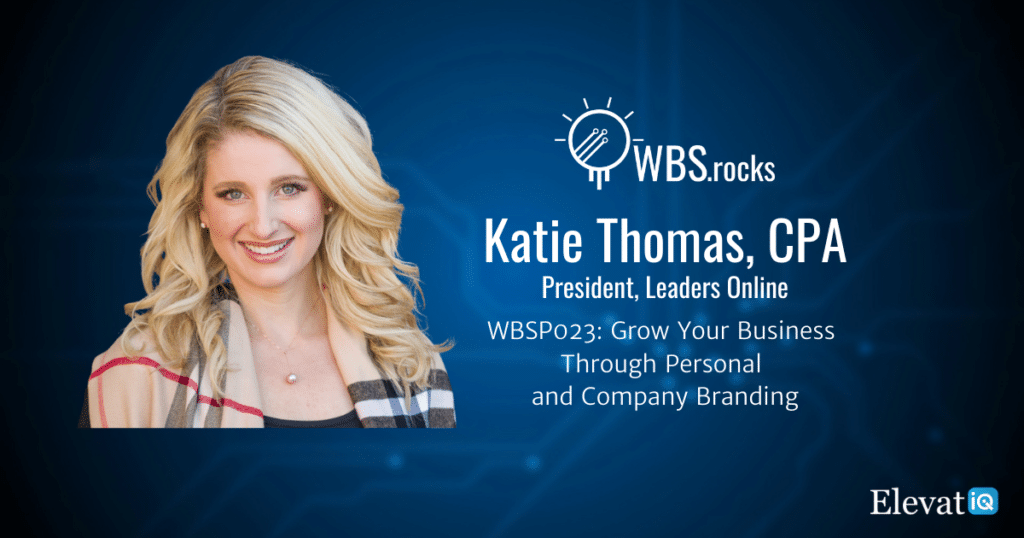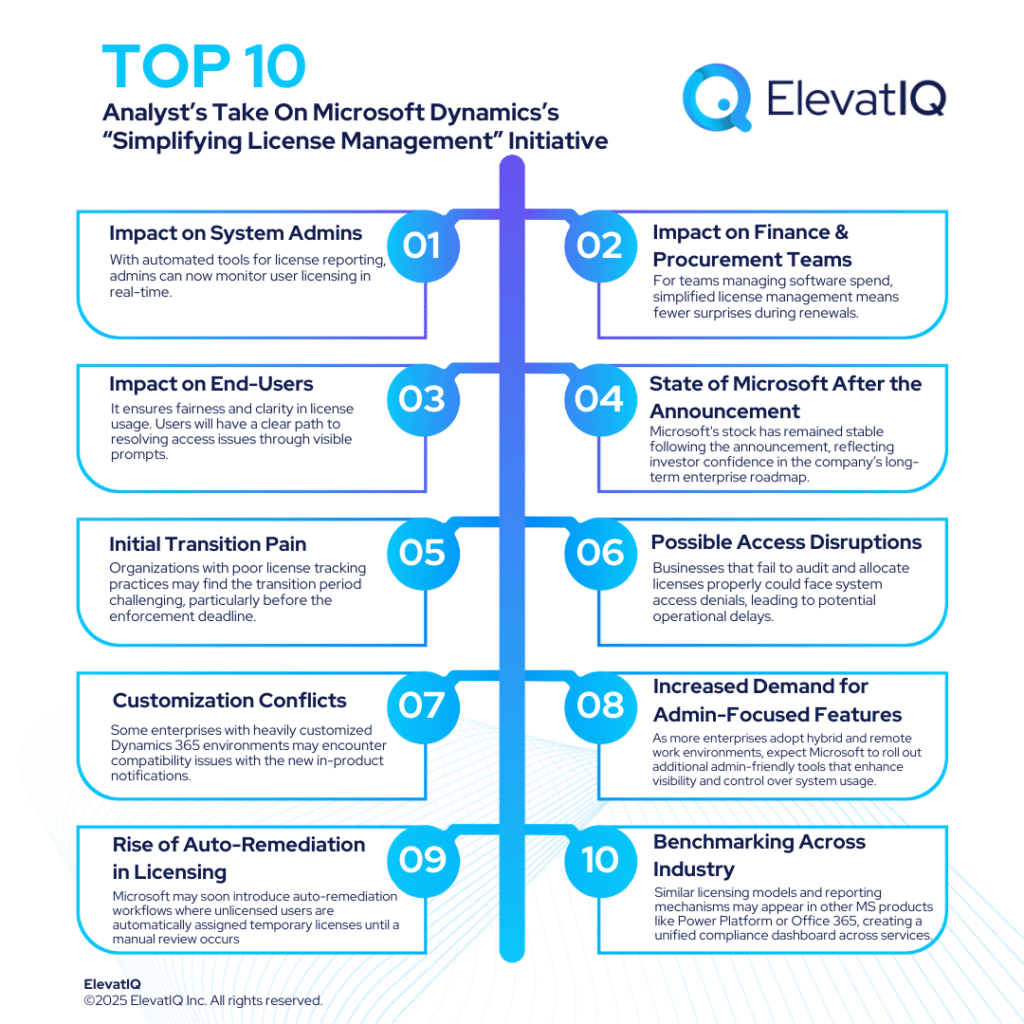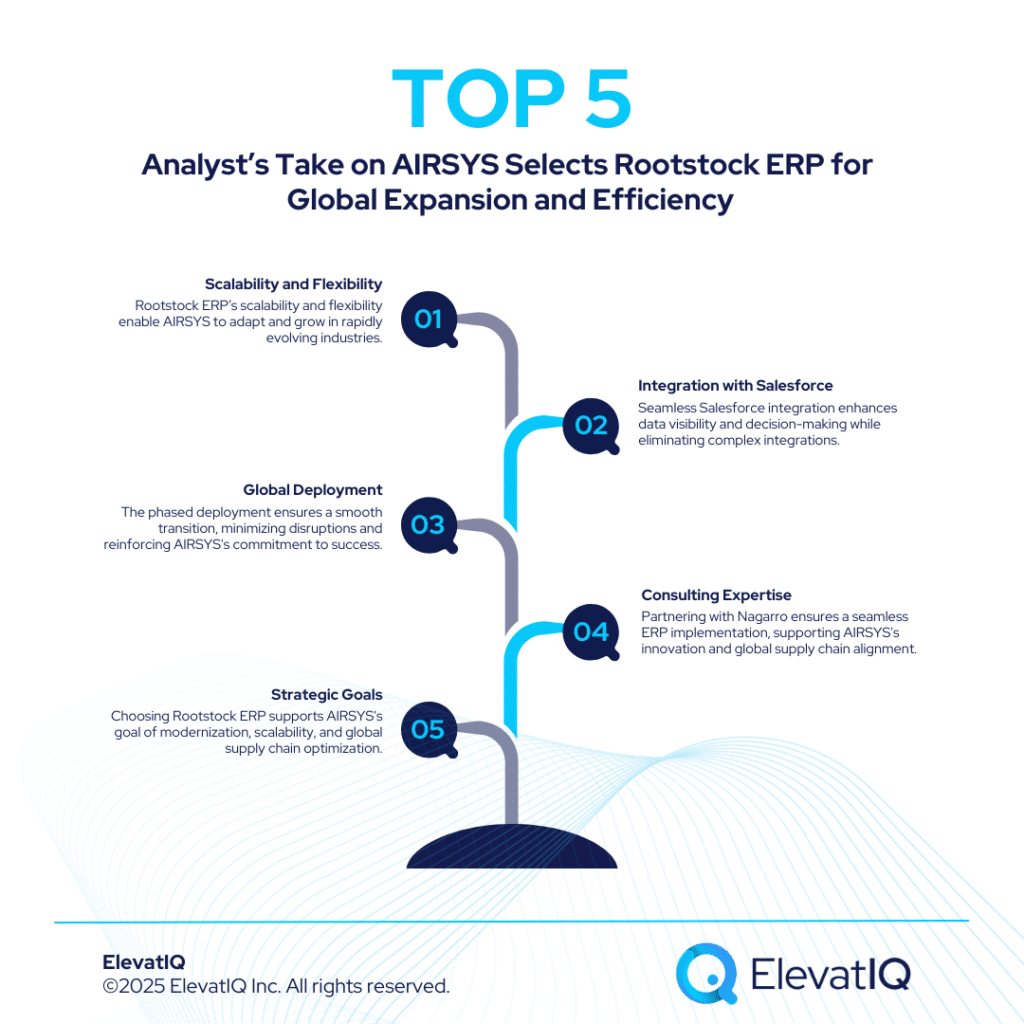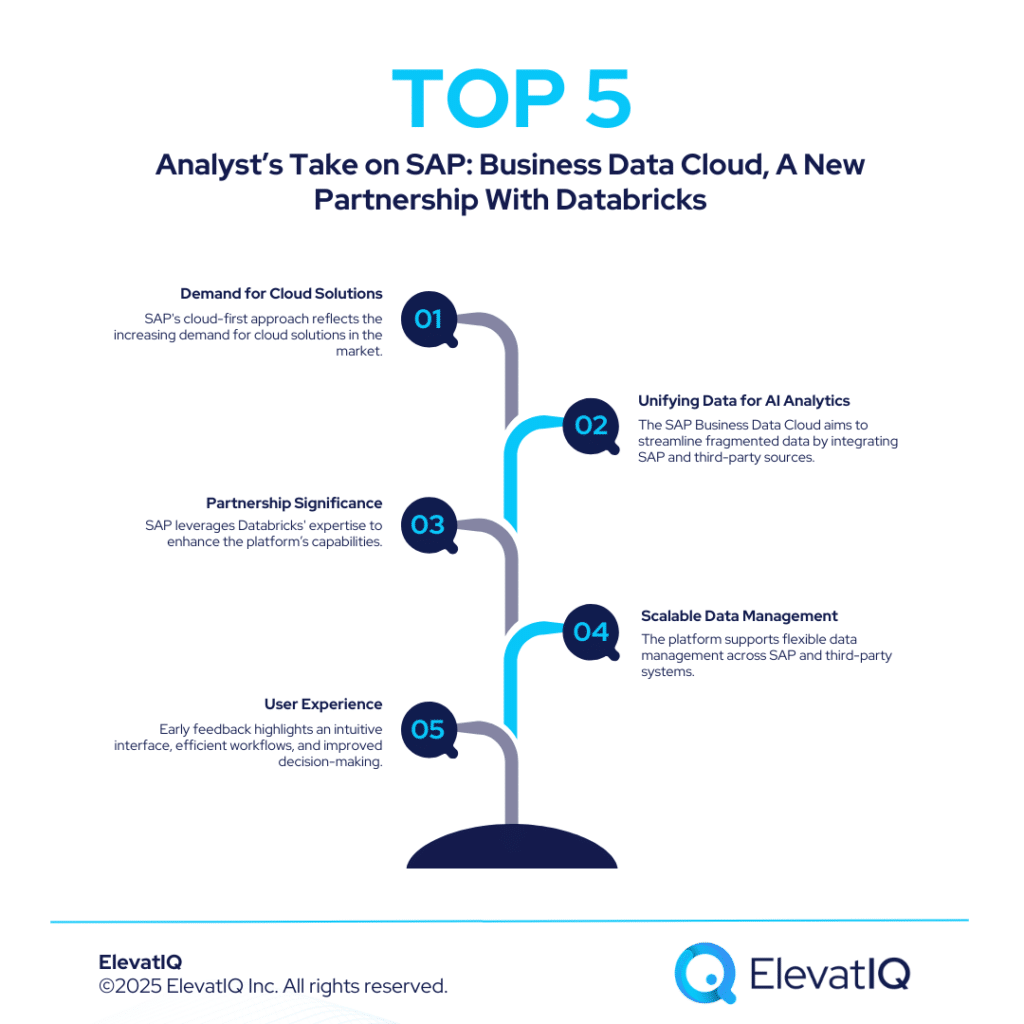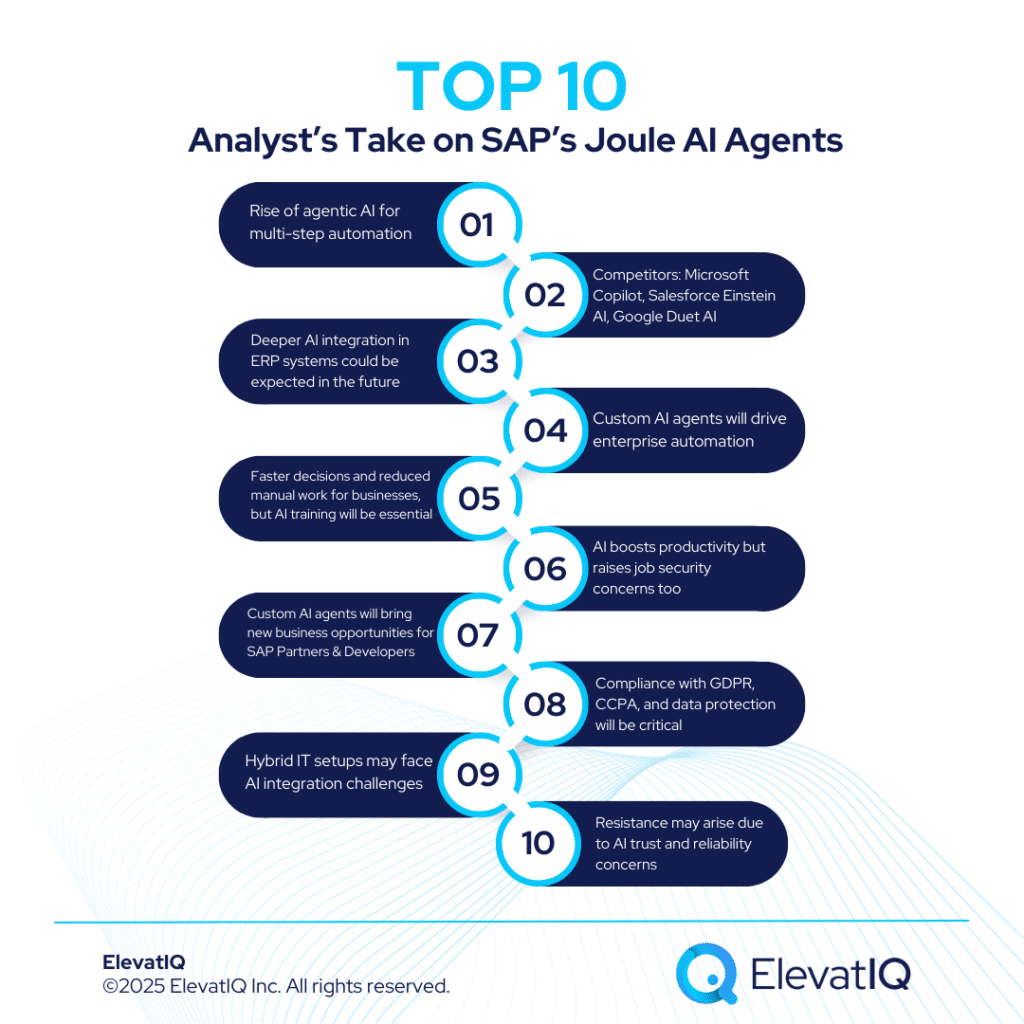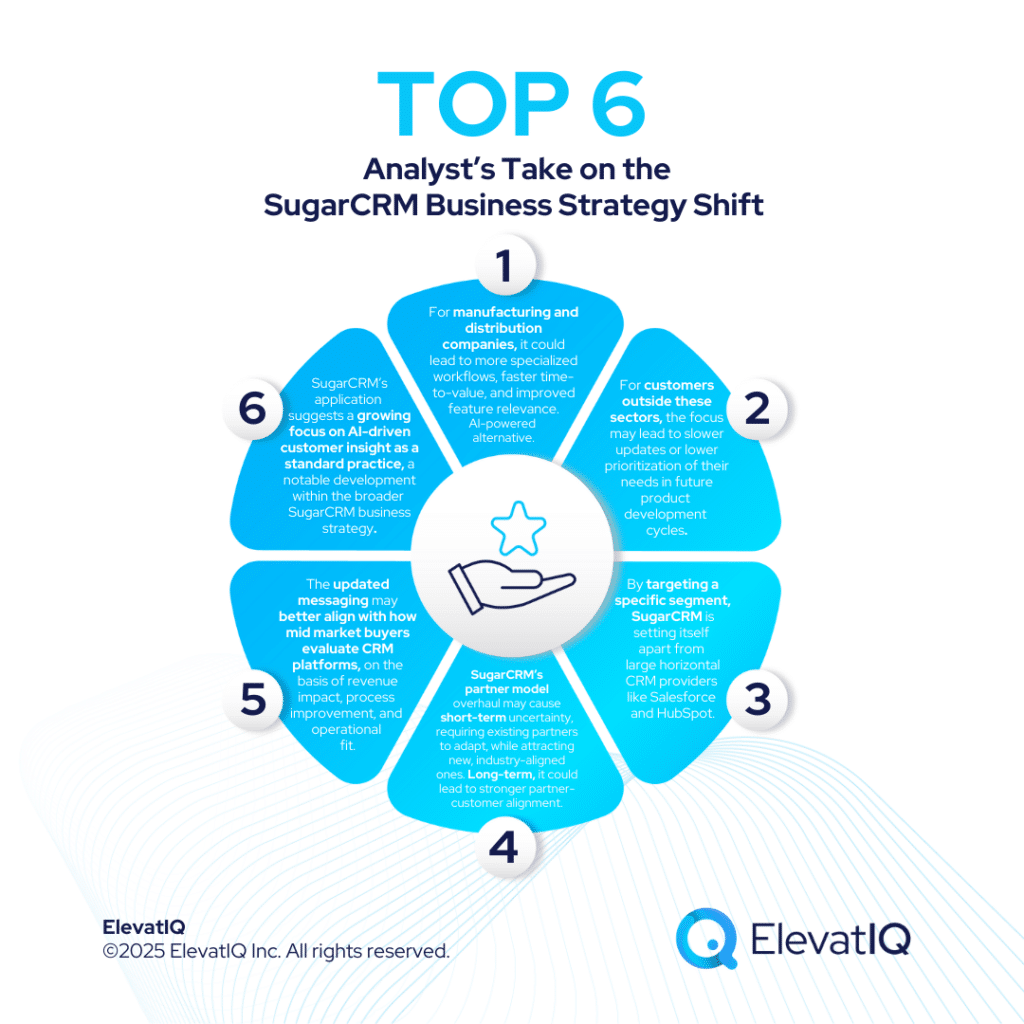Last Updated on November 27, 2023 by Sam Gupta
In this episode, we have our guest Katie Thomas from Leaders Online, who discusses the importance of personal brands and why personal branding is essential for personal growth and corporate branding. We also had a chance to touch on why accounting and finance subject-matter expertise is critical for marketers to reduce marketing spend. Finally, she also covered how executives can drive their employees to be more active on social media to generate opportunities.
Chapter Markers
- [0:00] Intro
- [2:39] Personal journey and current focus
- [6:21] Her perspective on growth
- [6:38] Importance of subject-matter expertise for marketers
- [10:49] Importance of sales skills for executives
- [14:41] How operations and finance executives can improve their personal brand?
- [18:27] Why does personal branding matter?
- [23:44] Content strategies for finance and operations executives
- [27:58] Why does company branding matter?
- [30:53] Who should be accountable for company branding?
- [32:49] Closing thoughts
- [34:13] Outro
Key Takeaways
- When you can speak your clients’ language, and truly understand their business, it allows you to provide a lot better service to them and also to allow the message that you’re creating for them to resonate better with their prospect.
- To understand how posts work on LinkedIn, you have to recognize that there’s an art and a science to it. And the art is what’s going to really make your posts stand out in the art is going to be your stories, your experiences, how you actually teach or talk about a subject. And the science is going to be the tactics of the posts. So the length of the posts, the hashtags, the buzzword.
- Personal Branding matters because it’s ultimately how people do business with people. People buy from people and companies that they resonate with, they don’t just buy the product or the service because they buy from you, and how you put yourself out there, whether it’s positively or negatively, you’re creating a brand for yourself.
- There are four types of content. And when I say types, I don’t mean like video, text, audio, but really like four different sectors of content. And the first one is educational. So this is typically really easy for people to come up with. And it’s going to be like tips and teachings, action steps that people can take to reach their goal. It could be myth-busting.

Subscribe and Review
Apple | Spotify | Stitcher | Google Podcasts | Deezer | Player FM | Castbox
About Katie
Katie Thomas, CPA is the owner of Leaders Online, a digital agency that helps executives increase their influence, impact, and income through thought leadership marketing. Leaders Online serves clients all around the world and works with some of the top accounting and finance professionals.
Resources
Full Transcript
Katie Thomas 0:00
You can get better. I think as we grow as humans and we advanced in our careers, we can get comfortable in what we’re doing and what we’ve always done and try something new. Just like with anything, say whenever you went to school for the first time, it’s uncomfortable, and we have to get over that. And that’s really what it is. It’s a lot of times having the confidence to try something new.
Intro 0:26
Growing a business requires a holistic approach that extends beyond sales and marketing. This approach needs alignment among people, processes, and technologies. So if you’re a business owner, operations, or finance leader looking to learn growth strategies from your peers and competitors, you’re tuned into the right podcast. Welcome to the WBS podcast, where scalable growth using business systems is our number one priority. Now, here is your host, Sam Gupta.
Sam Gupta 1:03
Hey everyone, welcome back to another episode of The WBS podcast. I’m Sam Gupta, your host, and principal consultant at the digital transformation consulting firm, ElevatIQ.
Growing a company today is no longer the same as it used to be five years back. Today, your customers expect you to be thought leaders in your industries. While we have been using social media to enhance our personal and company brands for quite some time. The game has entirely changed in the last three years. The companies that are actively promoting their brand and encouraging their employees to elevate personal brands will have a substantial edge compared to the rest.
In today’s episode, we have our guest, Katie Thomas, from leaders online who discusses the importance of personal brands and why personal branding is essential for personal growth and corporate branding. We also had a chance to touch on why accounting and finance subject matter expertise is critical for marketers to reduce marketing spend. Finally, she also covered how executives can drive their employees to be more active on social media to generate opportunities.
Let me introduce Katie to you.
Katie Thomas CPA is the owner of leaders online, a digital agency that helps executives increase their influence, impact, and income through thought leadership marketing. Leaders online serve clients all around the world and work with some of the top accounting and finance professionals.
With that, let’s get to the conversation.
All right, Katie, welcome to the show.
Katie Thomas 2:36
Hi, Sam. Thanks so much for having me on.
Sam Gupta 2:39
Just to kick things off. Do you want to start with your personal story and what you’re working on these days?
Katie Thomas 2:44
Yes. So my name is Katie Thomas. I am a CPA, and I run an online digital agency called leaders online, where we help executives increase their influence, impact, and income through thought leadership marketing. So my career started out probably a lot different from many digital agency owners and service providers out there. I actually started out in public accounting. So I am a CPA, and I continue to hold my license today.
And, you know, it’s interesting, because I got into public accounting, actually, in a way where I was going to college, I was working at my family-owned business at the time doing sales and marketing, I loved it. And everyone said you should get an accounting degree. Accounting is the language of business. And so I took accounting, I was like, wow, this is, you know, it comes really natural. To me, it makes a lot of sense.
But it’s interesting, because all along, I was like, I just I don’t know if this is for me, but you know, the years go on, I graduate. And the next step is you might as well get your CPA because you went to school, you got a degree in accounting, and you should go and get the CPA.
So I went ahead, got the CPA. Well, to make your license actually active, and you can pass the test, but then you have to work. So I went to work at a public accounting firm and went to work at Ernst and Young. The whole time while I was there, I kept wanting to do sales and marketing.
I actually went to one of the partners there. After working there for a few years, I said I enjoy my work, and I was getting to work on some really great projects. But I know that my heart is in marketing and in sales and creating relationships with people. I really want to go into business development, is there an opportunity?
And I got this blank look like, what are you talking about?
Katie Thomas 4:47
You’re a CPA, and unless you’re a partner, there’s just really not an opportunity here. That’s when I recognized that the CPAs, and I’m sure are very similar for a lot of other similar professions out there, you really aren’t taught the skill set to grow a brand to create an online presence in today’s world. And then you get to this partner level, and you’re just expected to know how to do it.
I thought, well, there’s probably an opportunity here to go out and help accounting firms. That’s where we started with doing just that. And so when I left, I took the skill set that I had learned at working in the accounting firm knowing their business and how they operate some of their pain points, how they serve clients, knowing how to speak their language and went to them and said, Look, here’s what we can do, here’s this opportunity, is this something you’re interested in.
And it’s been a really cool journey to see how there are all of these amazing professionals out in this place. They have great businesses, they offer amazing services that transform lives, but their reach and the impact that they could be making. It’s not tapped into because they aren’t taking advantage of this amazing opportunity to market themselves and be confident and marketing themselves.
Sam Gupta 6:21
Okay, amazing. So, there are some very interesting points here that I would like to dig deeper into. But before that, I am going to ask one question that we ask all of our guests, and that is going to be what is your perspective on growth? Katie, what does growth mean to you?
Katie Thomas 6:38
So when I hear the word growth, I think of getting bigger, getting better. And so of course, as humans, we can become better we can develop ourselves physically, mentally, spiritually, as business owners, we can grow a bigger business, create better bottom-line, but really when I truly think of growth, and what that means to me is how can we, as humans get bigger, create a bigger impact that spreads to more people and create a better world as a collective. So as people and as business owners, executives, it’s not just about becoming better as ourselves, but it’s about growing and impacting others along the way.
Sam Gupta 7:16
So now we are going to move on to the other things that you mentioned as part of your intro. And one of the things that makes me super curious about your CPA designation, and you said you’re still maintaining that.
That could be hard, I guess, as a marketer? Because and I don’t know, if you find the sales and marketing world, more exciting, I think you do, because that’s what you mentioned, as part of your intro. So do you still like going through the CPA curriculum? Or do you not?
Katie Thomas 7:43
I like it because I think that everything that I have to do, for say, continuing education, not only helps me as a business owner and a leader become better and grow my business, but it allows me to understand what a lot of our clients are dealing with and help educate them on say, for example, this cares act that came out when COVID hit, or this new legislation that just came out allows me to stay up to date so that I can even help them communicate better with their prospect market and their current client.
Sam Gupta 8:18
Yeah, and I find the thing very interesting, because, you know, I don’t know, if any marketers out there are actually going to have CPA designation, it’s very hard to find that, in my opinion. In my opinion, sales and marketing folks should have deep subject-matter expertise of clients’ business.
This is the challenge that we have seen across manufacturing. And I asked this from marketing agencies that are focusing on manufacturing. Okay, why are you focusing on manufacturing? Can you speak manufacturing? And the same question I’m going to ask you, Katie, you know, you are speaking with accounting and accountants, right? you need to be able to speak their language. And I can almost guarantee that the other folks that are not CPA will not be as deep in their insights when they are writing the content.
So in your opinion, having a CPA designation, does it matter? If yes, why?
Katie Thomas 9:13
So it doesn’t matter from a sense of, are you capable of doing, you know, marketing at all, but like you said it, when you can speak your clients’ language, and truly understand their business. It allows you to provide a lot better service to them and also to allow the message that you’re creating for them to resonate better with their prospect.
So I don’t want to say that it’s having a CPA designation is an end all be all, but I think that what having a designation like that. What it does is it helps qualify you to the applicable party that you aren’t just saying that you understand their business, but you truly you’ve been tested, and you’ve passed that test. So you really do get it.
Sam Gupta 10:11
Yeah. And your clients don’t have to spend as much time in training you when you are writing content for them, creating the marketing collateral for them, you are probably going to understand when you walk in the door of your clients.
Katie Thomas 10:26
Exactly. And it goes further than just coming up with topics. But it’s fact-checking the blog post. It’s making sure that we can write what’s relevant today. Because as anyone who’s tried to file a tax return ever knows, the tax laws are constantly changing. So it’s just the whole process of marketing becomes easier.
Sam Gupta 10:49
Yeah, and you bring a very interesting perspective because you mentioned that blank look during your introduction with your partner. And if I go back to my journey, as well, and I have had sort of the crossover as well, a few sales and marketing roles, and a little bit of it of finance. And I can relate so much.
So when you were growing up, you know, you had two choices, either you were meant for sales and marketing, or you were meant for the slightly more back-office job, but now more and more crossover I’m seeing in the market.
So in your opinion, when you had this, this journey in the partner firm, obviously, you, you must have realized that the CFOs don’t really have as the sales and marketing skills, or I don’t know if deep is the right word there, to be honest, to describe the sales and marketing skills. But everybody needs communication skills, everybody needs sales skills, to be able to succeed in their job. So what would be your perspective for CFOs and CEOs in developing those skills and why they are so important to have?
Katie Thomas 11:52
Yeah, so I think that it first just comes with acknowledging that you may have great technical skills, but non-technical skills are equally as important. And what got you to where you’re at now can’t always get you to where you want to go. And so if you can look at it in the way of, I may be really good in this area. But I’m okay with accepting that when I try something new, I may not be as good, but I can learn, and I can improve, and I can get support from you know, maybe it’s someone internal to your company, or someone you hire, you can get better.
I think as we grow as humans and we advance in our careers, we can get comfortable in what we’re doing and what we’ve always done. And to try something new. Just like with anything, say whenever you went to school for the first time, it’s uncomfortable. And we have to get over that. And that’s really what it is. It’s a lot of times having the confidence to try something new and recognize that it may be difficult, but there’s a lot of opportunities that we can capitalize on and create a bigger impact if we are to take that chance.
Sam Gupta 13:08
Okay, so what are some of the specific skills that you see are missing in the, let’s say, you know, finance or operations executive that they can improve on?
Katie Thomas 13:17
So if we’re gonna look at it from a marketing standpoint, I mean, there’s a lot of skills that any buddy can learn. But what I like to do is focus on, like, what are the things that you specifically need to be involved in, because there’s a lot of skills that you really you should just have a professional, it’s not the best use of your time.
And the skills that they really should be investing time in is making sure that they’re, they’re actively participating in creating their personal brand and their company brand. Because whenever you think about all the brands that are popular and ones that people know, it’s because they give you feelings, they, you think about Nike, you know, it’s just doing it. It’s like an Olympics. There’s Amazon. It’s quick. It’s fast.
When you think about, like a personal brand, let’s say like, even like, Will Smith, he’s funny. They all give you feelings. And as CEOs and CFOs, we have to be actively curating and participating in developing that brand, and what feelings we want to evoke, and what kind of inspiration or motivation or change that we want our company to create through our products or services.
Sam Gupta 14:41
Yeah, so the two words that you mentioned are personal branding and company branding. And I see a lot of changes overall in the marketplace. And in the last three years, especially the social media platforms like LinkedIn have come a long way at this point of time, especially for b2b businesses.
So obviously, personal branding is huge because that actually helps with your career. Other folks need to know you. So whatever content you’re writing on LinkedIn, a lot of operations folks and the finance folks are becoming active on LinkedIn as well. But they are not as active as the sales and marketing folks. So I don’t know what is going to be your perspective on that.
Katie, what would be your recommendation to some of these finance and operations executives on improving their personal brand?
Katie Thomas 15:26
Oh, my goodness, I work with those exact people every single day. And if you want to create a personal brand online, you should absolutely start with social media. It’s not going to require a lot of your time. And you can create your personal brand, get it out into the world very quickly.
But it’s gonna take you creating content because the content is how people get to know you. And I know from having the same conversation every single day with people just like you who are listening to this episode, that whenever you bring up creating content, it can be very intimidating because you may not know what type to create, you may think that you don’t have time to create it.
But really, the truth is, Sam, the truth is that everyone has all the content they need inside of them, especially if they’re at this CEO level. And you don’t need a lot of time to create it. But what you do need to do is understand the different types of content that you can create.
And some simple frameworks around like, how do you actually present that content so that people can easily consume it and take the action that you want them to take from that content? How do you actually get them to do it, and you can just use a framework?
Sam Gupta 16:48
Okay, and this is my challenge working with marketing people, to be honest. I mean, they get deep into the content and copy. And let’s say, if I’m the operations or finance executive, I don’t even understand what content word means. So can you tell me what different types of content are? What can I create myself so that my personal brand is going to be stronger on social media?
Katie Thomas 17:08
Yeah, so let’s just take it a step back. And whenever you think about creating content, we can think of them as creating posts. If we’re saying just creating a post on LinkedIn, you have to understand that, really, there’s an art and a science to it. And the art is what’s going to really make your posts stand out in the art is going to be your stories, your experiences, how you actually teach or talk about a subject, that’s good, what’s going to make it successful.
Now, anyone can learn science. The science is going to be the tactics of the posts. So the length of the posts, the hashtags, the buzzword, but the art, that’s what’s going to make your content your posts stand out. So this is, this is your unique stories, your experiences, your ways of teaching.
And that is really learning the art. That’s what’s going to make you successful. And if it weren’t for this art piece, social media wouldn’t be as powerful. But the great thing is, too many people worry about the science, the tactics, what hashtags I should use, but they forget about this art, and they lose touch with their audience. So the arts is what’s going to connect you to your audience, but the science that’s going to be kind of what helps speed up or enhance the art that you’re putting out there.
Sam Gupta 18:27
Okay, so let’s talk about personal branding a bit more overall. Let’s say if I am an executive, okay, and I don’t know how much time it is going to take from my side on a daily basis in creating the content is going to LinkedIn, and I’m not even sure how it is going to help me.
So tell me why personal branding matters?
Katie Thomas 18:51
Personal Branding matters because it’s ultimately how people do business with people. I mean, people buy from people and companies that they resonate with, they don’t just buy the product or the service because they buy from you, and how you put yourself out there, whether it’s positively or negatively, not at all, you’re creating a brand for yourself. So if you actively develop your personal brand, you’re out there making an impact and creating an opportunity for you to try to create a perception that you desire.
So let’s say you do nothing. You might be creating a perception that you don’t desire, but you can take charge of that and actively create the perception that you want, and you desire people to perceive a view of your company, your services, your products.
Sam Gupta 19:47
So this could be very applicable for the sales and marketing guys, and you know, if I’m the operations or the finance guy, my expectation is going to be this is the job of my sales and marketing team.
So why as an operation or a finance person, I should care for personal branding, and why I should invest my time in personal branding?
Katie Thomas 20:07
Well, you should absolutely invest your time in it because you’re creating opportunities for not just your company but also yourself. I believe that as we actively develop ourselves, and if we’re open to sharing that we’re developing others, and we’re creating an opportunity for people to really connect with us on a deeper level, because as we share stories that people can relate to, and learn from.
And that’s a lot of what personal branding is, is, it’s just sharing stories and showing that you’re human, that’s going to create connections that you don’t know, what could result of them, whether it’s actually like a business opportunity for your company, or it’s a personal opportunity for a friendship, or maybe it’s another job opportunity down the road.
Or maybe it’s a partnership opportunity where you start up your own company, you don’t know where that could lead to, and what opportunities but again, it goes back to at the end of the day, we’re all people, and we’re all striving for this collective growth as a society and as a world as a whole and you creating your personal brand. It’s just plugging right into that growth.
Sam Gupta 21:23
So I’m completely on board with that. But let’s say let’s take a scenario, let’s say I’m the operations and finance guy. Obviously, I care for the world, and I care for the society as well. But I need to worry about my own priorities, too. I’ve got 24 hours on my clock. And I work, let’s say as operations or finance executive, I work for 15 hours a day, I have to take care of my family. And now I have to spend time on personal branding. As far as the opportunities go, I have a stable job. I don’t really care for the opportunities as much. So why does personal branding matter for me?
I’m not necessarily looking for an opportunity. And you did mention that job opportunity down the road. So how big is going to be a factor, let’s say in the future, especially what we have seen in the last three years, with respect to personal branding, how much personal branding is going to be relevant in hunting for the next job,
Katie Thomas 22:22
I think it’s only going to continue to become more relevant and more, much more of a say, the requirement that you have a brand there. I mean, just look at changes on social media platforms you mentioned, like the past three years, and everything’s changed.
For example, on Facebook, a few years ago, you could create a post on your company page and get it seen by 1000s of people today. If you’re not paying and you’re not running an ad, it’s going to get seen by hardly anyone, most likely. So when are you are thinking about, like, why should I care if I’m that person who has a stable job, I am already working 14-15 hours a day, it’s to remain relevant.
This is where the future is going. As you’re in this position, you’re part of your job, no matter what your job is, even if you’re a finance professional is you need to remain relevant. And part of doing that is active online. And it’s not, while you’re online that you know, maybe it’s connecting with other people in your position, seeing what they’re doing, what maybe they’re doing better than you what you can improve upon. It all goes back to, though, you growing and developing and staying relevant.
Sam Gupta 23:44
Right. So, let’s talk about some of the content that you mentioned. So let’s say if I’m the finance or operations guy, I don’t feel that I have anything exciting to talk about, to be honest. I’m not even sure how I’m going to be sharing any content. So what are some of the things that I can consider when I am creating these posts?
Katie Thomas 24:08
So I like to say there are four types of content. And when I say types, I don’t mean like video, text, audio, but really like four different sectors of content. And the first one is educational. So this is typically really easy for people to come up with. And it’s going to be like tips and teachings, action steps that people can take to reach their goal. It could be myth-busting.
So as the finance guy, you likely are really close to understanding what products and services you offer. Even if you’re in the financials, you understand what’s being sold. So what are maybe some myths around those products and services, what do people need to know about them, that’s all going to be educational. Then there’s brand content.
So brand content is going to be stories about your journey, impactful moments in your life turning points that led you to where you’re at now, so maybe, why did you get to the position that you’re at? Maybe Why did you leave your previous job? It could also be like your why if you’ve read like Simon Sinek, it could be your hobbies, quirks, interest, anything that others can connect with.
Katie Thomas 25:20
So what do you enjoy doing outside of your work? Where do you get some mental relaxation? What do you like to do on the weekends? All those things, they’re important people want to know that you’re human, then there’s also professional content. So what’s going on in your industry? Are there changes that are going to impact you, your clients? What’s going on in your organization? Are you looking to hire? Are you, you know, changing technology? What are you struggling with? If you’re open to sharing, maybe you’re What you are looking for.
So new staff, new clients, networking groups, testimonials, you could a post community involvement also great. And then finally, what we see a lot of content and can turn people off social media is monetization content—so launching pitching promotions announcement that invites and monetization contents. People absolutely need to know what you have to offer them.
But you just need to make sure that you’re not only doing that, and within that, we have these four categories. It’s really important to note that there can be overlap. One post could be in multiple categories. So let me give you an example. Let’s say that you, I work with a lot of accountants.
Katie Thomas 26:32
So let’s say you’re an accountant, and you have an educational post about three ways you could reduce your taxes this year. And then at the end, you say if you’d like to learn some more tips, then go ahead and sign up for my webinar here. So you had a monetization piece, you did have some sort of promotional posts, but you also gave some education in it. Another thing was, let’s say that you’re, you know, an executive coach, you could say, here are three things that you need to consider this year when you’re looking to create a more purpose-led organization with transformative business results.
And then again, you could say, you know, if you want to learn more about this, then be sure to sign up for my newsletter, where I send out weekly tips or, you know, something like that. So whenever you start looking at these different categories, we all can create branded content, we all have a story, we all have things that we like to do outside of work, or that got us to where we’re at now, none of us just ended up in the position that we are today.
Just because we woke up, we did certain things. And same with educational content, you’re an expert in what you do. And you know, whether it’s teaching about your job or teaching about the product and services that the company offers. That’s, that’s all stuff that you can easily talk about and discuss.
Sam Gupta 27:58
Okay, so now we are going to move on to the other topic that I really wanted to talk about, which is going to be company branding that he mentioned in the conversation.
So in my opinion, I think the onus is really on the companies, how they want to position themselves on social media because from when you look at the organization perspective, or the company perspective, it’s one company, it’s not sales and marketing versus, you know, accounting and IT. It doesn’t work that way for the company. It’s going to be when we look at the company branding. It’s going to be opportunities for the company, the more opportunities that the company has, the better.
So some companies, especially when I look at some of the startup world, what they do is that they have incorporated this as part of their performance model, or as part of their comp model that you need to be active on social media. Everybody needs to be active. It does not matter whether you are a CEO or janitor. Everybody needs to be posting the content on LinkedIn, and everybody needs to be liking the content that companies are posting, or commenting or whatever.
Sam Gupta 28:57
Because you know, when you let’s say your sales or marketing team is sharing the content, just five or ten people are going to be there. But let’s say if your whole company spends time on social media, now we are talking about 50 people trying to influence the content, trying to promote the content, that could be a big deal.
So when I look at these startups, they’re really going after each and every employee and encourage them to go to social media and promote the content. But when we look at the bigger companies, they don’t necessarily have that. And in my opinion, we have seen this in the last three years. And this is probably going to be more relevant in the next three to five years that the companies that are promoting their employees to promote the content on social media are going to have a competitive edge.
So what is your perspective on that? Katie, when it comes to company branding?
Katie Thomas 29:45
Absolutely. I completely agree, Sam, and they’re going to, I believe, have a competitive edge, of course, from getting noticed by their desired market. But I also think that acquiring top talent is another big one, where they’re gonna have a competitive edge because, as someone says, fresh out of college or middle-aged and on LinkedIn looking for a new job, whenever I see this company that’s clearly communicating their brand, their values, what they stand for their culture. And I see a bunch of people engaged with it. I want to be a part of that.
It’s just like going to say High School. People want to be a part of the group. They want to be part of the cool kids. And if you are creating that online, that community, that culture, then yeah, you’re going to get left behind. And I think that a lot of times people do that are starting to think about this, they think, well, maybe we’re missing out on, you know, the market share.
But it’s like, what about also all that wonderful talent? That’s huge. As you know, getting the right people in your organization helping you build it is huge. And so I think we need to consider that too.
Sam Gupta 30:53
So, where should the motivation come from? Let’s say if you were the CEO of a company, Katie, and you are, let’s say, if you were running a manufacturing or distribution business, and you want to make sure that you are able to tap the opportunities when it comes to personal branding, company branding, but at the same time, the employees need to be focused as well in their work, right, because you need to make sure you are making money, you are finding some opportunities as well because some of these efforts on social media could be harder to track when it comes to ROI.
So, where should the drive come from? Where should the motivation come from? Does it need to come from the CEO? Or, does it need to come from HR? Does it need to come from sales and marketing?
Katie Thomas 31:35
So I think it’s an interesting question. And you know, how people are motivated is different for everyone. I think that having a general consensus that encouraging everyone to post is great. Some companies I’ve heard actually offer you a bonus or an incentive based on your participation on social media. And that’s going to be individually each company if they want to do that.
But I think that something that all companies can do, beyond just encouraging people to post, is helping them understand how they can do it. Because whenever we do something new, if we don’t have instructions, or feel like we can competently take that first step, then it’s a lot more difficult if someone can come in and not just say, hey, post on social media, but here are some samples of posts that you can create.
Here are some formats that you can use. Here are some hashtags that you can use. And here are some ways that you can schedule your post here, maybe some places you can get stock photos, just a simple training, and education around it. That can go a long way to getting people to take part and being active on social media.
Sam Gupta 32:49
Okay, amazing. Katie, this has been a fun conversation. I hope you enjoyed it. That’s pretty much for today. Do you have any last-minute closing thoughts?
Katie Thomas 32:58
Yeah, well, thanks, Sam. So thanks so much for having me. As the closing thoughts, it doesn’t matter if you’re talking about your company brand or your personal brand. People want to know that there’s a human behind you. So there’s a human behind the company, there are humans, and behind your brand, there’s a human. So anything that you do, as you’re looking to develop your brand. Just remember that people do want to know you’re human.
So one of the things that anyone can do today is just to get on LinkedIn and spend 30 minutes and voice message, your newest connection, say hello, introduce yourself, and wish them well, that you will be shocked at how many people respond and are amazed that you took the time to send them a personal voice message.
That’s really what I think is so important to remember as we are in a digital world is. You can’t replace yourself, and the more that you can have involved in it, the more success you’re going to see from it.
Sam Gupta 34:01
Yep, I couldn’t agree more. The more human your company is, the better you are going to do with respect to your hiring with respect to your growth. So on that note, thank you so much, Katie, for your time and insight.
Katie Thomas 34:11
Thank you, Sam. I appreciate you.
Sam Gupta 34:13
I cannot thank our guests enough for coming on the show for sharing their knowledge and journey. I always pick up learnings from our guests, and hopefully, you learned something new today. If you want to learn more about Katie or leaders online, head over to leaders-online.com. Links and more information will also be available in the show notes.
If anything in this podcast resonated with you and your business, you might want to check other related episodes, including the interview with Brian Burke from sellyourmac.com, who touches on his growth secrets, and how they became the fastest-growing company on INC 500 3x. Also, the interview with Corey Warfield from CoryConnects where he discussed how to hack LinkedIn algorithms and grow your company using LinkedIn strategies.
Also, don’t forget to subscribe and spread the word among folks with similar backgrounds. If you have any questions or comments about the show, please review and rate us on your favorite podcasting platform or DM me on any social channels. I’ll try my best to respond personally and make sure you get help.
Thank you, and I hope to get you on the next episode of the WBS podcast.
Outro 35:30
Thank you for listening to another episode of The WBS podcast. Be sure to subscribe on your favorite podcasting platform, so you never miss an episode. And for more information on growth strategies for SMBs using ERP and digital transformation, check out our community at wbs.rocks. We’ll see you next time.


